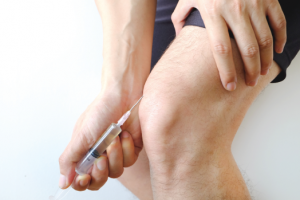
Seasontime / shutterstock.com
A two-year study among patients with knee osteoarthritis (OA) showed that steroid injections for knee pain were no more effective than saline injections and actually reduced cartilage volume more than placebo. The study, conducted at Tufts Medical Center in Boston, looked at progression of cartilage loss and change in knee pain after treatment with placebo or intra-articular injection of 40 mg triamcinolone acetonide every three months for two years. Results were published in JAMA.1
Background
Knee OA is a widespread condition that affects millions of mostly older people and is a leading cause of disability, according to the JAMA article. For years, doctors have been using corticosteroids to temporarily treat pain resulting from knee OA, with debatable success.
“Osteoarthritis is a very common disease, and there isn’t any treatment that’s really been shown to be effective over the long term,” lead study author Timothy E. McAlindon, MD, MPH, chief of rheumatology at Tufts Medical Center, tells The Rheumatologist. “In particular, we don’t have any treatments that are generally believed to be disease modified.”
Pain in the knee is caused by inflammation that can happen when protective cartilage in the joints wears down and bones rub together. Patients with the condition often have difficulty with weight-bearing physical movement, such as standing up, walking, running or various forms of exercise.

Dr. McAlindon
Rheumatologists have a toolbox of treatments for knee joint pain, such as physical therapy, orthotics, topical medication, simple analgesics and even surgery, if deemed suitable. Yet a subset of patients return regularly every three months to have their knees injected with steroids because they have no other suitable treatment choice, Dr. McAlindon says.
Steroids also may be used for patients who have reflux or peptic ulcer or kidney disease because anti-inflammatory medicine is contraindicated. In cases like these, rheumatologists may resort to giving repeated steroid injections, Dr. McAlindon says.
No doubt, patients have benefited from short-term steroid injections to treat flare-up pain that lasts two to four weeks, Dr. McAlindon says. However, historically there has been concern about potential damage to joints, based partly on animal studies that suggested steroids can damage healthy cartilage, according to Dr. McAlindon.
On the other hand, inflammation exists in osteoarthritic joints, notes Dr. McAlindon. “Of course, steroids are potent anti-inflammatory agents, and more recent animal studies suggest that steroids may actually slow down disease progression.”
Inflammation is a common ailment among patients with progressive knee OA. Corticosteroids injected into the joint area can reduce cartilage damage associated with synovitis—inflammation of the membrane that lines the joints—but carry a possibility of adverse effects on cartilage periarticular bone, according to the JAMA article.

